- Home
- E. B. White
Letters of E. B. White Page 7
Letters of E. B. White Read online
Page 7
Cush sends his best
Andy
To JESSIE HART WHITE
Beta Theta Pi house
Ohio State University
Columbus, Ohio
26 April 1922
Dearest Mum:
I am hoping this will arrive on April 27 to greet you on your 42nd wedding anniversary, but I am a little late in starting it as usual. Your letter reached me at Mansfield, O. a couple of days ago where it was forwarded from East Aurora. I guess I told you in one of my previous letters that the way to reach me by mail is via 159 Park Place, East Aurora. Mr. Cushman does the forwarding.
So you’ve been gay for forty years
For forty years and two—
Been jolly all through smiles and tears
So you’ve been gay for forty years:
A thing one very seldom hears.
I send my love to you.
So you’ve been gay for forty years
For forty years and two.
I hardly think I have written you since we left East Aurora a week ago Monday in the afternoon. We remained over Easter at the Cushmans’ and had Easter Sunday dinner at the Roycroft. The next day we left, clanking merrily out of town with our bed upon our back as goes the turtle. . . .
Spring has arrived in Ohio. This is a flat state where red pigs graze in bright green fields and where farms are neat and prosperous—not like New York farms. We roll along through dozens of villages and cities whose names we never heard. They are typical of the middle west. The oldest inhabitant is generally standing somewhere pulling a long white beard, the smithy door is generally open and the sound of the anvil to be heard, the village flapper is generally flapping up and down along Main Street in front of a group of jobless youths who help hold the drug store up, and somewhere there is always a housewife sweeping off a porch or carrying a spadeful of manure to the garden. Toward evening the country scenes become idyllic—the sort of thing you have seen in the moving pictures and never quite believed in. Sheep come drifting up long green lawns where poplars throw interminable shadows, come drifting up and stand like statues beneath white plum blossoms, while far down the lane and off in the fields a little Ford tractor moves like a snail across the furrows. Lilacs are in full bloom and the lavender ironwood blossoms are coloring all the roads.
I’ve given up cigarettes until I get to California. Isn’t that a good idea? Cush thinks it’s great. I also am looking forward soon to giving up clean shirts. They’re worse than cigarettes. I’m on my last one now.
The Ford is a tremendous expense. Repairs have cost us 75 cents since we left New York—50 cents for a busted radiator and 25 cents for a fan belt. Pretty heavy going.
New York is the state for roads. Here there are pikes, which are cement on one side and dirt on the other. When you meet another car if you are on the cement side all is well, and when you are on the dirt side you steer to one side, sink down indefinitely, and then get out and lift the car back onto the road again. That’s why Fords can go places where heavier cars have difficulty. Whenever your Ford shows signs of weakening, you can lift it back where it belongs.
Tell Father he ought to read Benchley’s Of All Things if he wants a good time. I read it the other day in Mansfield. It’s about as funny as anything there is on the market today with the exception, of course, of the Cushman-White travelogues which are simply killing.
We’ll be leaving for Kentucky on Friday morning. This place is so beautiful we want to stay for a day or so to become acquainted with it.
Congratulations again on your anniversary. Have a good time at Atlantic City honeymooning. Love to Father—tell him I received his letter and thank you. I mailed the slip to the Trust Company the other day in Mansfield.
Yours,
Andy
To JESSIE HART WHITE
Highland Springs Free Camping Ground
Campers’ Supplies. Fresh Butter Eggs
and Milk. Refreshments Routing and
Cave Information Free.
Western Kentucky—Monday May 8 [1922]
Dear Mother:
We are now within 950 miles of St. Petersburg, Florida. Every sign along the road gives us that information, due probably to an active Chamber of Commerce in the above city. “Whereabouts are you-all goin’?” ask various persons whom we meet along the way. “West,” we answer. “Then what are you-all doin’ down round here?” “Oh, we just dropped down,” we answer in a kindly voice.
I have no doubt that the last place from which I wrote was Columbus, Ohio. Since that time we have journeyed by devious means down into Kentucky, West Virginia, back into Kentucky, back into Ohio, back into Kentucky, and here we are, three miles west of Cave City and all primed to see one of the seven wonders of the world. This part of Kentucky is full of caves—no home is complete without one.
About the first thing we did out of Columbus was try and join Spark’s Circus, which was playing Circleville, O. It was a bright, warm noon when we encountered Circleville, and one of the first things we saw was a big steam calliope. The big top and painted wagons were visible down a side street—so we parked, dismounted, and drew near afoot. One side show was open to take care of the early afternoon visitants that filtered in, and the red-necked barker was cajoling patrons, garnered from the ring of idlers who gazed in sheepish bewilderment at the picture of Joe, the man eating gorilla, at the picture of Toto, the seven-year old tot who fondles boa-constrictors, at the picture of Gunder, the rhinoceros straight from the heart of Africa—wondering whether the moans that emanated at regular intervals from within the show were made by Joe, Toto, or Gunder, or by a small colored boy pulling a raspstring. “There he is,” sobbed the barker, pointing to the incomparable Joe on the billboard. “That’s Joe—that’s the gorilla that makes men quail with terror. He’s in there. They’re all in there; and they’re all alyuve.” The fact that the parties in question were alive was too much for the impressionable man, and he broke down. “It’s only a dime, and they’re all alyuve.” Whether because of the man’s tears or because of the moans from within, two or three more individuals would weaken and pass inside, followed by the envious gaze of the others.
Mr. Spark felt that we would be a redundancy in his troupe, unfavorably impressed as he was with Cush’s inability to turn handsprings,—so we passed on to see what remained of Circleville. “A woman sawed in half—bring your own saw” read Mr. Spark’s signs along Main Street, and the populace clearly had nothing else on its mind that day. I have read of the middle west and heard it talked of, but I first met it in Circleville. It is a town that enjoys a mild industrial prosperity of a sort, and it is near enough what we call civilization (Columbus) to know that its Main Street should be nicely paved and its stores glass fronted. It does all these things and smacks its lips with civic pride. . . .
We kept going south, and that afternoon began to run across turtle-doves—always in pairs. We slept that night on a little hill in the Ohio Valley, east of Portsmouth.
Eastern Kentucky has queer stubby hills which rise quite abruptly from the Ohio River. A week ago today we recrossed the Ohio at Ashland, taking the indolent ferry boat “City of Ashland,” which is without shape and without ambition, and which is gently propelled—at the expense of an enormous quantity of native coal—by a stern-wheel made from farm-planks. Queer how rivers are like the people along their banks—or vice-versa. There you have the well-groomed Hudson, hustling businesslike and blue about its business, flanked by docks and store-houses and factories and estates, and bearing on its shoulders men-of-war and punctual ferries and doughty tugs and splendid excursion steamers with their shiny decks and well-oiled, throbbing engines. Here, where the populace drawls and sits leisurely on front-porches, we have the muddy Ohio, creeping indolently down a smiling valley, blending its pretty brown with the greens of the field, and floating little old flat boats sculled by calm country men. Cush and I watched a gala craft, the Homer Smith, come drifting down from Pittsburgh, announcing himself by t
he charmed calliope—come drifting down and swing informally in to the mud bank, scornful of wharves, and stand to, held by an ancient mud hook, and taking passengers over a long plank from shore.
From Portsmouth to Maysville was along a dirt road on the Ohio side of the river. We went as far as we could, in and out of holes the like of which you never have seen, and finally ended in a creek bed at eight o’clock, without lights, without food, and without much conception of where we were. So we slept. The next morning a farmer said he had heard us and thought we were revenue officers come to investigate the family whose children had been coming to school drunk from moonshine.
It took us in all about three hours and a half to go from where we had slept to Maysville—a distance of eighteen miles. What few rattles were still latent in Hotspur developed rapidly, and he now clatters along with the orchestration of a mature car. We made him clatter up the milelong hill in Maysville, from which point we turned and had a wonderful view of the Ohio and the town below, and of the stubby hills of Kentucky, and of the brown and green fields across the river, white in splotches with the blossoms of locust trees. We were not to see the Ohio again until Louisville.
. . .The Blue Grass is hard to describe. The region must be very like parts of England. There are rolling downs where sheep, duroc pigs, and horses and cows graze. The grass is a luxurious blueish-green, and the heavy oaks and beeches give the landscape a park-like effect. At first we couldn’t figure out what made the region so different from anything we had ever seen, and finally we realized that it was because of the complete absence of weeds, underbrush, and indiscriminate foliage. It is as if there were a great gardener stalking through with a magic trowel, pruning and hoeing. The homes are led up to by long arbors, and the houses themselves are usually set way back from the road. The stables are more elaborate and beautiful than the dwellings—great brick buildings (in the case of breeders who have a racing string) covered with vines and surrounded by blossoming trees. . . .
It rained as we drew into Lexington (we passed up the sights of Paris) so we took a room at the Lafayette and led Hotspur to a fashionable garage. It was the first time the little fellow had been among other cars in so long that he was much embarrassed, Cush says, and little beads of oil stood out all over him.
The races were on in Lexington. We soon discovered that. The lobby of the hotel was full of horsey men, in stripes and checks, who looked as though they knew the record of every filly of any account back to 1880. And full of racy women—wives of the horsey men. And full of small colored bell-hops in purple uniforms and enormous gold buttons, going about carrying strawberry cocktails to the guests.
In the morning we acquired a Chicago racing form for ten cents. “I think I’ll back Sweet Cookie,” sighed Cush, “she ought to roll in.” I noticed that one race was scheduled for virgins, and I was for picking out a likely looking one and staking our all. As a matter of fact we were much chagrined at our inability to decipher the pages of statistics. I read the leading editorial and an advertisement entitled “Get yourself behind a veteran horseman,” and made no appreciable gain. The former consisted of a list of names, tabulated, of which I understood nothing but the weather report. The latter informed you that one George Black would let you in on something neat, for fifty dollars. . . .
[Cush] spent the whole morning poring over asterisks and past performances, and even read the advice of sporting writers in the morning papers. “A little knowledge is a dangerous thing,” said I, quoting from my good Pope. “I shall maintain my chaste ignorance, and pick some paradoxical mare such as Hopeless.”. . .Two o’clock found us, flushed with the ecstasy of being near a Kentucky course, parting with a hard earned two dollars to get inside the gate. “Show me whar ah do mah bookin’,” I demanded of Cushman in my best accent.
Refreshed by two hamburgers we paraded up and down in front of the mutuel machines, and read the selections for the first race. I saw Cush stealthily pull a memorandum from his pocket and consult it privately. “They all give it to John F. Turner, with Rapid Stride to place,” he mused. “Nonsense,” I replied, glancing at the list. I was strangely attracted by the very first name (there were eight in all). It was “Auntie May.” There was something conservative about it—something quieting amidst the fury of the gambling atmosphere. “Auntie May is the animal,” I breathed, much to Cushman’s disgust, who was averse to my throwing away my money on a creature that not one sporting writer had so much as mentioned and that didn’t figure in the dope. “All you have to do is look at the machine,” he cautioned. There were the figures being rung up as the betting progressed—and for every hundred on John F. Turner there were only about fifteen on Auntie May. All the others were in between.
I approached my booking stall, clutching another two dollars tightly and wondering whether I should call out “One on Auntie May,” or “One on Number 1312,” which was the corresponding mutuel number. Fear seized my heart that when I should finally be face to face with my clerk my voice would waver. No such thing occurred. I rose well to the crisis. “One on Auntie May,” I called vigorously, as though she were my closest relative. The bookie garnered in my two dollars and handed me a small green ticket marked 1312-straight—which meant that I was signifying my belief that the good animal was coming in none other than first. By this time I was so suffused with charitable emotions and a sudden love for this mare that I only now dimly remember placing the ticket in an inside pocket. Cush was visible in the next aisle, buying a ticket on John F. Turner.
An Eskimo pie apiece settled our hamburger, and we reached the grandstand fit and hearty. Cush had bought a program. Betting was quickening in the stalls below and the crowds were pressing out and up into the seats beside us. . . . “Let me see the program,” I demanded.
The race was scheduled, I observed, for “maidens three years old and upward.” By carefully tracing down the page I found that Auntie May’s number was 8. This was a needless effort, for when a moment later I looked up and gazed down the track I knew her immediately. The race was, as I have said, for maidens three years old and upward. Auntie May looked upward of thirty-five. Probably the first thing I noticed about her was her color. The other maidens were all of uniform hue—that is, each had her own uniform shade. There were sleek bays and sleek browns and one beautiful black. Not so Auntie May. She was a sort of brindle—as though she had once been brown until the moths got in. I had never before seen quite such a marking on any animal—not even on a bird. Cush was impolite enough to laugh outright.
Probably the next thing I noticed about Auntie May was her composure. The other maidens were all life, all zest. They were frisking and sidling in the most maidenly fashion. One even kicked up her heels in an attempt to unseat her jockey, and had to be calmed by the groom on the lead-pony. You could tell by looking at them that the race had been on their minds all night and that they had been chafing in their stalls. You could tell by looking at them that the happiest moment in their lives would be when they should go to the barrier. You could tell by looking at them that each one nursed the spirit of competition that goes with Kentucky horseflesh. . . .
Not so Auntie May. She not only had no personal enthusiasm for the race, but she had actually lost interest in life. The sight of the eager stands failed to thrill her; the feel of the turf under hoof failed to send a gladdening beat to her heart. She never once even so much as glanced at the other seven maidens. They all wore blinkers on their eyes to keep their high-strung nerves from being shattered at a passing object. All but Auntie May, who needed no eyeshade.
I was sobbing quietly in my seat in the stands, beating gently upon my breast. Suddenly the starter cried “Come On,” the barrier leapt up, and we were aware that the action had begun.
There never was such a change in any animal. Folks at home, I wish you could have seen my Auntie May! Thirty-five years of maidenly experience had taught her that prancing and showing enthusiasm in front of the stands before starting time required just so many vitamin
s, and that the real dope was to save ’em for the performance. . . . I should have said before that from the first I had noticed that Auntie May sported a wonderful looking pair of legs. They were legs that any maiden could be proud of. And the upshot of it all was that when the starter yelled “Come On” and the barrier flew up, my good animal suddenly uncoiled like a watch spring, and with a super-maidenly leap cast herself clear over the heads of the enthusiastic frisking competitors, and landed about a quarter of a mile down the track, with both pairs of legs beating indomitable time.
And it is to the credit of the other seven maidens that they stuck it out and ran the whole mile to the finish line. And it is to my own credit that I deported myself as a gentleman should deport himself when his pony comes home several lengths ahead of the nearest rival. I merely said quietly, “Good animal, Good May,” and again, “Good animal, excellent relative,” and went downstairs to present my little green ticket. And haply the odds had been so awful against this motley maiden that they handed me $24.60—twenty-four dollars and sixty cents, good mother, in the currency of our nation. And there was much moaning in the ranks of the backers of John F. Turner, as well there might be, for he failed even to place.

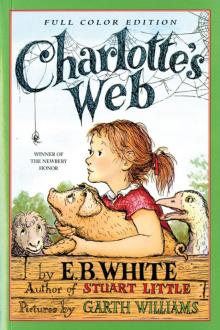 Charlotte's Web
Charlotte's Web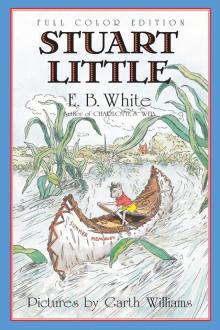 Stuart Little
Stuart Little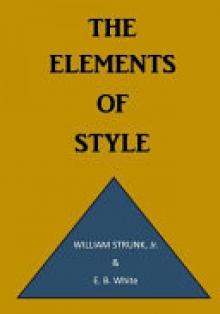 The Elements of Style
The Elements of Style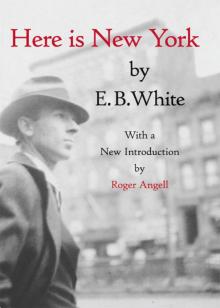 Here Is New York
Here Is New York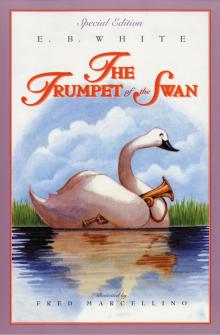 The Trumpet of the Swan
The Trumpet of the Swan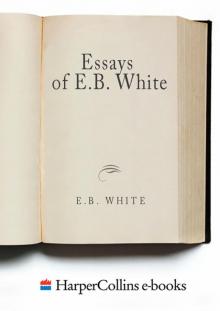 Essays of E. B. White
Essays of E. B. White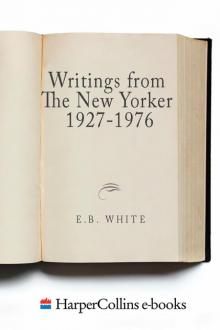 Writings from the New Yorker 1925-1976
Writings from the New Yorker 1925-1976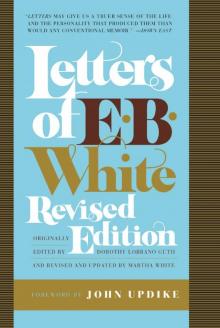 Letters of E. B. White
Letters of E. B. White